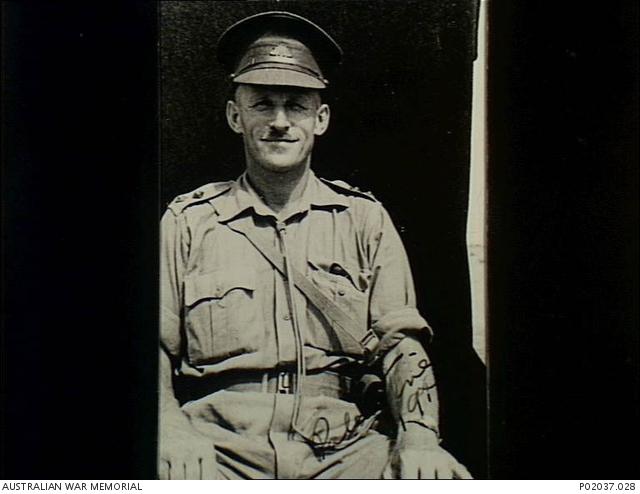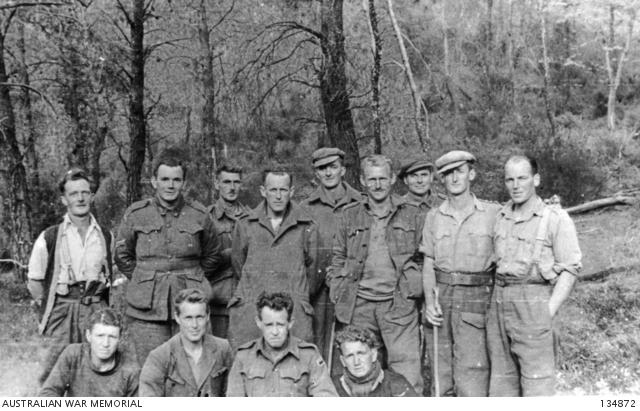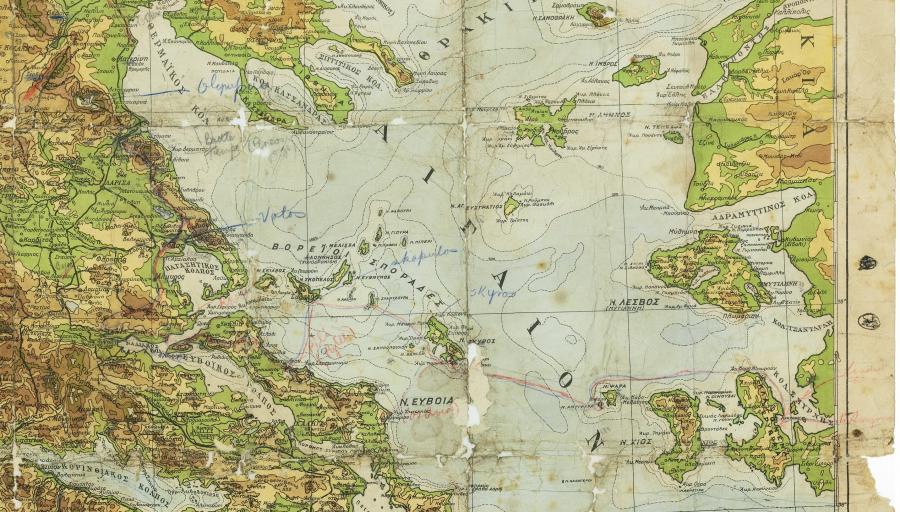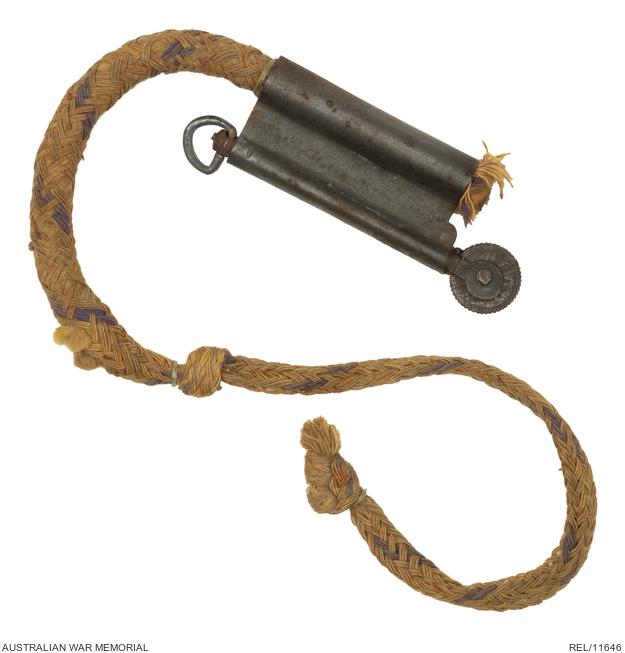A daring escape

Portrait of Captain Bruce "Effendi" Brock.
When the Germans invaded Greece in April 1941, Bruce Brock and his mates were left isolated and cut off. But with initiative, courage, the goodwill of local Greeks and Turks, and a little bit of luck, they escaped the advancing German forces, making an epic 37-day journey through rugged mountainous terrain and swampland to rejoin their unit in Palestine.
Their story was told at the Australian War Memorial in Canberra as part of Against all odds, a special exhibition featuring personal stories of escape and endurance from the First World War to Afghanistan.
Curator Dianne Rutherford said Brock’s story was an incredible story of endurance, kindness and luck.
“They couldn’t rely on being rescued, so they had to try and make their way south through the mountains to get back to the Allied lines,” Rutherford said.
“But by the time they got there, they found out that the Germans were already there, and that the Allied forces had gone, so they had to change their plans.
“There were a number of occasions when they were almost caught or shot up … so they were incredibly lucky.
“But they wouldn’t have survived and made it through without the help of the local people.
“There was the risk of reprisals – very serious, genuine risks – but a lot of the villagers still helped them as much as they could.
“They were often quite poor, and didn’t have a lot themselves, but they were willing to share what they had.
“And that generosity, as well as their own determination, helped them survive.”

Officers and men of the 2/2nd Battalion near the village of Pili on Euboea Island. Front row, left to right: Private J.A.E. Whitton, Lance Sergeant R.C. Smith, Private H.R. Brown, Private W. Schofield. Back row: Private M.J. Sanders, Corporal J.W.H. Fuller, Corporal H.J. Honeywell, Lieutenant Colonel Fred O. Chiltern, Captain Charles Hercules Green, Captain Bruce Brock, Lieutenant A.K. Bosgard, Captain A.A. Buckley, Corporal J. Shanahan.
Born in Darwin in March 1907, Brock was a school teacher at Woonona when the Second World War broke out.
A lieutenant in the militia, he was seconded to the 2/2nd Battalion in November 1939. He sailed for Egypt in January 1940 and was promoted to captain in July 1941, taking part in 2/2nd Battalion's early battles in Bardia and Tobruk in Libya, and then the Greek Campaign.
The 2/2nd Battalion was among the units posted to defend the Pinios Gorge, a narrow pass which led to the sea between Mt Ossa and Mt Olympus.
When the Germans attacked on 18 April 1941, the battalion was able to help delay their advance, allowing the main force to escape further south, but with no ammunition, and being circled by German troops, they were forced to retreat, escaping into the hills in small groups.
Brock’s group of about 20 men headed south, trekking for days through mountains and swampland in a desperate attempt to reach the retreating Allied forces.
With no food, and very little equipment, they relied on the generosity of local Greeks to help them survive and evade the Germans.
“Brock tended to go into the villages first,” Rutherford said. “He didn’t speak Greek, but he spoke French, so he was able to communicate with them, and a local school teacher in one of the villages gave him a map which they used to make their way out of Greece, and into Turkey.”
The map was a simple classroom map of Greece and the Aegean, but it was better than the map they had been using, which had been given to them by a group of New Zealand soldiers they met while escaping into the hills.
Their attempts to decipher the Greek writing and their notes are still visible on the map, which is now part of the National Collection at the Memorial.
They had been told to head to the coast, where a submarine would be waiting for them. But to get there they would have to cross an exposed valley where they could be spotted by patrolling German aircraft, so they stuck to the hills and kept heading south.
While passing along the shores of a lake, they spotted German planes operating from a newly-established air strip. When a plane came to investigate, the men raced for a large spreading tree and hugged its trunk to hide from view. The pilot swooped down, rose, turned and swooped again several times, but didn’t open fire.

A detail of the map the men used to escape mainland Greece and reach Turkey.
In the villages they learnt of daily warnings broadcast by Nazi radio propagandist Lord Haw Haw: the Australians were skulking in the olive groves and would be caught and castrated; Greeks caught helping them would be shot.
Despite the risks, the local Greeks continued to help them, and often told them of a submarine waiting for them at the coast, at Volos. There was just one problem: the Germans were also at Volos.
Avoiding the temptation to look for the submarine, the men continued south and waited in the dark to cross the road that led into Volos.
“Some German vehicles came up the road and stopped for a toilet break right where they were,” Rutherford said. “They leapt into the ditches on the side of the road, and Brock made the comment that he was nearly soaked and he just had to stay perfectly still.”
One of the Germans had walked off the road and almost stumbled over Brock, who was lying flat on the ground, motionless in the dark.
“It was really close, and they were very lucky not to get caught,” Rutherford said. “Brock seemed to think that what saved them was the fact that the lights of the cars were on. They created shadows and helped hide them, but the fact that the German vehicles had their lights on at all showed that they had superiority of the area. They weren’t worried about being seen, and then went off on their merry way.”
One of the men in the group, against advice, headed back towards a village known to be occupied by Germans. “To hell with the Germans,” he told them. “I'm hungry.” He brazenly joined a German mess queue, allowing the Germans to believe he was under escort, got himself fed, and then escaped to the coast where he was picked up by a submarine.
By 24 April, the rest of Brock’s group were close to Lamia, north of Thermopylae.
That night, the men were awakened by a colossal artillery barrage. They could see the flashes of the guns as they thundered in the distance, and then there was silence.
The next morning – Anzac Day – they were told by one of the locals that what they had heard were the last shots being fired before the Allied forces pulled out.
The Germans now held the pass. Their spirits sank. For days they had set their hopes on rejoining the main force. Now the last of the Australians were being evacuated from the beaches.

This flint and tinder rope lighter, also known as a trench lighter or a shepherd's lighter, was given to Captain Bruce Brock by a local from Euboea Island after he had escaped the Greek mainland in April 1941.
They decided to make for the island of Euboea and find a boat to take them to Turkey.
As they made their way through the hills, they met a group of Greek girls who insisted on giving them bread and cheese. The girls had been studying in Thessaloniki when it fell to the Germans, and were now fleeing Lamia.
“They were trying to get back to their families, but what Brock didn’t know until later was that one of the girls had put money into his pocket while he wasn’t looking,” she said. “That money ended up going towards paying local fishermen to ferry them to the islands.”
On the island of Euboea, they joined other men who had escaped mainland Greece, including a group led by battalion commander Lieutenant Colonel Frederick Chilton.
They set sail for Turkey, travelling from one island to another as they crossed the Aegean. When a German bomber appeared in the sky, the men huddled under blankets as the Greek ferryman crossed himself. The plane skimmed by overheard, and then took another run at them, but nothing happened, and it flew off.
When they finally reached Turkey, they were met by Turkish soldiers and reunited with more troops from their battalion at Smyrna.
One of the Turkish officers they met was a First World War veteran who had fought Australians on Gallipoli and in the Sinai. He fitted them out with civilian clothes, gave them a bag of rations, and put them on a train for the three-day journey to Alexandretta. They then boarded a Norwegian tanker bound for Egypt, and caught a train to Palestine, rejoining their unit on 25 May at Julis, the camp where they had started from in 1940.
“Turkey was neutral during the Second World War, so technically the Turks should have interned them, but that said, they were more sympathetic to the Allies,” Rutherford said.
“All up, it took about five weeks from mid-April to late May for the men to get back to their unit, but they were determined and they managed to get through.”
Brock returned to Australia in mid-1942 and was discharged from service in January 1944. He never forgot his mates and their epic journey.
“They really were very lucky,” Rutherford said. “They were lucky they weren’t caught by the Germans who had stopped for a toilet break; they were lucky they weren’t shot up by the aircraft that flew over them; and they were lucky that the Turks let them go …
“It’s quite an amazing story.”
The Memorial is temporarily closed to the public, but the Memorial is still telling stories about the Australian experience of war. To learn more visit here.